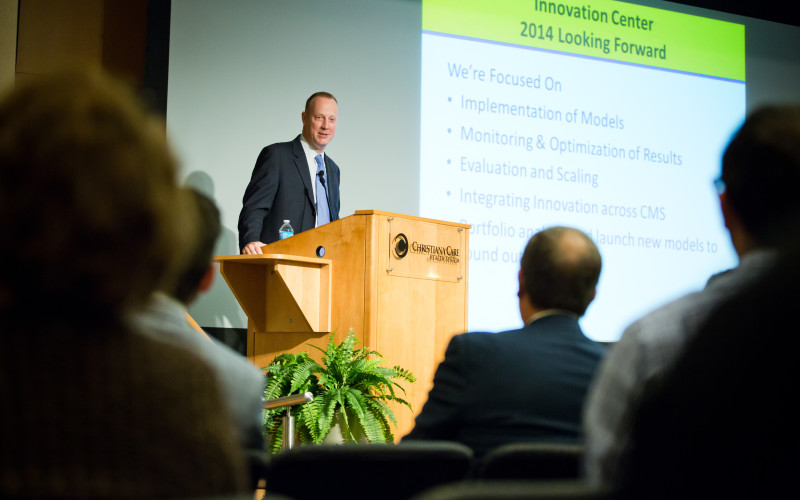Value Institute Symposium highlights U.S. health care in transformation

To achieve the ideal future of American health care — innovative, wellness-based and patient-focused — the Centers for Medicare and Medicaid Services (CMS) is creating and supporting value-based initiatives to transform health care delivery and payment systems. With its Value Institute, Christiana Care Health System is a leader in this national effort.
That was the message from Patrick Conway, M.D., MSc, the CMS deputy administrator for innovation and quality and CMS chief medical officer, at the Value Institute Fall Symposium at the John H. Ammon Medical Education Center, Sept. 29.
The centers that Dr. Conway oversees, including the CMS Innovation Center and CMS Center for Clinical Standards and Quality, are responsible for: value-based purchasing programs; quality-improvement programs in all 50 states; standards, survey and certification of Medicare and Medicaid health providers; and all Medicare coverage decisions for treatments and services.

“Dr. Conway’s work is very directly relevant to The Christiana Care Way and our mission of service to our neighbors,” said Robert J. Laskowski, M.D., MBA, who founded the Value Institute as president and CEO of Christiana Care. “Our strategy is value. Our work is to define what value is, to listen to our neighbors. It’s not just about what we value: At the end of the day it’s what our neighbors value that counts.”
CMS looks to hospitals and health systems to drive innovation and transformation in health care in ways that society can appreciate and afford, said Dr. Conway.
“We were often provider-centered, volume-driven and unsustainable, with fragmented care and fee-for-service payment systems,” Dr. Conway said. “We are now working toward our ideal future state: people-centered and sustainable with coordinated care. We are working on new payment systems and policies to get there, such as value-based purchasing, accountable-care organizations with shared savings, episode-based payments, medical homes, care management and data transparency.”
The goals of value-based purchasing and quality improvement programs include: making care safer by reducing harm; strengthening patient and family engagement as partners in care; promoting effective communication and coordination of care; effective prevention and treatment of chronic disease; promoting healthy living at the community level; and making care affordable.
Value-based programs tie a portion of Medicare payments not just to provision of services but to the quality and efficiency of health care delivery, as determined by quality metrics as well as patients’ own perceptions of their care.
“The goal is to reward providers and health systems that deliver better outcomes in health and health care at lower cost to the communities they serve,” Dr. Conway said.
Through the CMS Innovation Center, 20 major models are now being tested to improve quality. These include various accountable-care organization models, bundled payment models, the State Innovation Model Initiative, and Health Care Innovation Awards. Dr. Conway noted that Christiana Care already has earned one of the highly competitive innovation awards for its Bridging the Divides model, which provides more coordinated care and greater value for patients with chronic heart disease.
“We made investments in places like this one where we believe we’re going to learn what works in health care,” Dr. Conway said of the $10 million award for Bridging the Divides, a unique care-management program for patients with ischemic heart disease transitioning successfully from hospital to home. Bridging the Divides is participating in the CMS Innovation Center’s Health Care Innovation Awards program.
During his visit, Dr. Conway met with the Bridges project team, led by William S. Weintraub, M.D., John H. Ammon Chair of Cardiology and founding director of the Value Institute’s Center for Outcomes Research.
Later in the day Value Institute staff and scholars, led by Timothy J. Gardner, M.D., executive director of the Value Institute and medical director of the Center for Heart and Vascular Health, and Eric V. Jackson Jr., M.D., MBA, director of the Center for Health Care Delivery Science and associate director of the Value Institute, talked with Dr. Conway about ongoing research projects to achieve value-based goals.
“We need more institutes like this one to help our country achieve a health care system that values quality over quantity while spending our health care dollars more wisely,” Dr. Conway said.
Through the State Innovation Model initiative, CMS is partnering with individual states to design, test and support new payment, service and delivery models to improve health systems. In the program’s first round, 16 states, including Delaware, were chosen for the design phase of state innovation plans, and six for implementation. More than 30 states have applied to be included in the second round of the program.
Dr. Conway stressed that the underlying goal of value-based programs and other quality-improvement measures, with the complex metrics and reporting requirements they involve, is simple: improvement.
“Meaningful quality measures need to transition away from setting-specific, narrow snapshots and be increasingly re-oriented and aligned around patient-centered outcomes that span across settings,” he said. “The goal of a lifelong health management system is to optimize health outcomes and lower costs over much longer time horizons, from the early years of life to end-of-life care.”